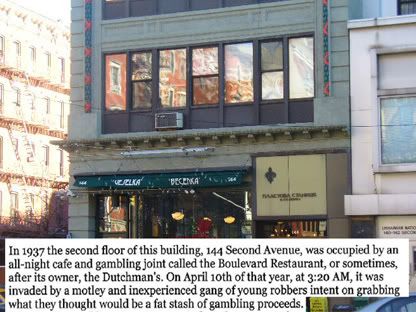
From a web site devoted to the history of the 9th Precinct in the East Village
In 1937 the second floor of this building, 144 Second Avenue, was occupied by an all-night cafe and gambling joint called the Boulevard Restaurant, or sometimes, after its owner, the Dutchman's. On April 10th of that year, at 3:20 AM, it was invaded by a motley and inexperienced gang of young robbers intent on grabbing what they thought would be a fat stash of gambling proceeds. The optimism of the greenhorn robbers was unwarranted: at the moment they chose to take the place, two plainclothes policemen, Detective Michael Foley and Detective John R. Gallagher, were inside enjoying a coffee break with the Dutchman.
Leading the charge up the stairs was 20 year old Arthur "Hutch" Friedman armed with a borrowed .32 pistol. Close on his heels were 17 year olds Dominick Guariglia (unarmed); Benjamin "Little Benny" Ertel (with a .38 that evidently did not work); and 22 year old Joseph Harvey O'Laughlin (with a .38 that did). Left behind on the sidewalk outside, with uncertain degrees of participation in the crime, were Philip "Sonny" Chaleff and Isidore "Little Chemey" Perlmutter.
As Guariglia barked, "This is a stick up! Everybody out!" he and Friedman began to herd patrons toward the kitchen in the back. O'Laughlin approached the Dutchman and his two friends: "All right, you bastards," he shouted, "in back with the rest!" Instead, the two lawmen went for their guns, and in a wild, quick flurry of shooting, Foley was fatally wounded. What started out almost as a lark had become a capital crime.
The case of the these novice gangsters, dubbed "The East Side Boys" by the press because they all came from the Lower East Side neighborhood around East Broadway and Clinton Street, was briefly notorious. Guariglia, O'Laughlin, Friedman, Chaleff, and a fifth defendant (Isidore "Beansy" Zimmerman, who was not present at the incident but was accused of supplying one of the .38 pistols), were found guilty of murder in the first degree on April 14, 1938.
On January 26, 1939, Guariglia, O'Laughlin, and Friedman were executed at Sing Sing. Chaleff and Zimmerman's sentences were commuted to life imprisonment. Chaleff died in prison in 1954.
Two of the "East Side boys" named in the indictment, Ertel and Perlmutter, went on the lam and were not tried with the others. Ertel was apprehended in Washington D.C. in 1938, and tried and executed in 1940 for his part in the robbery. Perlmutter died in 1956, never having been brought to justice.
Isidore Zimmerman's case is interesting. He was never accused of direct participation in the robbery, and all parties admitted he was nowhere near the restaurant that night. He was indicted, rather, for supplying one of the pistols, a charge he denied throughout his twenty-four years in prison. He was released in 1962 when it was proved that one of the witnesses against him in his original trial had lied. The state declined to retry him, and Zimmerman, after a very long absence, returned home.
21 years later the New York Court of Claims awarded him $1,000,000 for his ordeal. He died 4 months later, after having spent 24 of his 66 years in prison. Zimmerman had his death penalty commuted to a life term just hours before he was scheduled to be electrocuted (he willingly sought execution because of the intense psychological torture of being on death row)


























No comments:
Post a Comment